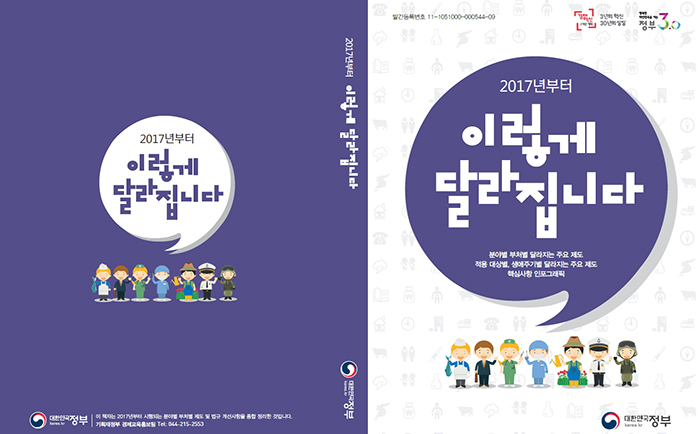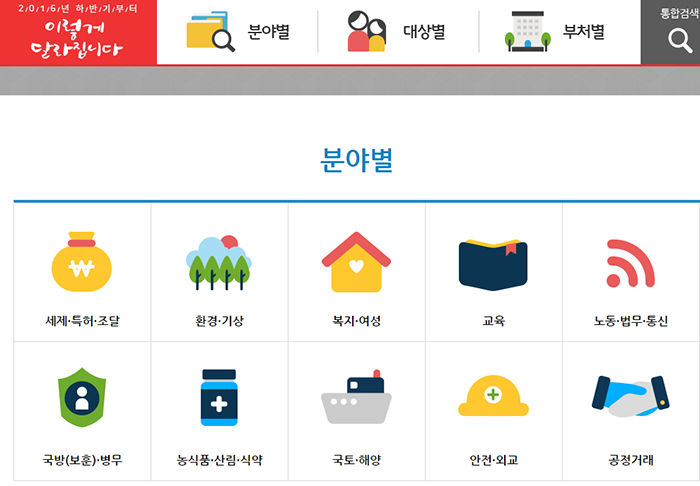-
 Korea.net's 24-hour YouTube channel
Korea.net's 24-hour YouTube channel- NEWS FOCUS
- ABOUT KOREA
- EVENTS
- RESOURCES
- GOVERNMENT
- ABOUT US

The Ministry of Strategy and Finance has published a booklet about new, in-coming policies that will be applied in 2017. The booklet introduces a total of 242 new policies that are scheduled to be introduced across many sectors, including health and welfare, employment and education. The booklet will be available at local government entities, including city government offices, district and county offices, and public libraries.
Increased wages during maternity. Increased childcare. Extended applications for retirement at the age of 60.
These are only some of the new policies that the government plans to enact in 2017.
Let's find out what new policies and systems are scheduled to be put into action this year.
Welfare policies will be some of the most noticeable ones. The government will increase wages for workers who use their maternity leave or who leave work due to miscarriages or stillbirths. It will be increased to KRW 1.5 million per month, from the existing limit of KRW 1.35 million. There will also be an increased subsidy of KRW 300,000 per person, from the current level of KRW 200,000, for small- and medium-sized firms that are categorized into a subsidy priority group when the firm grants childcare leave to its employees.
Healthcare benefits will be extended to pregnant women and to those who gives birth to premature babies or to low–birth-weight babies. Also starting this year, when a pregnant woman receives medical treatment as an outpatient, she will get a 20 percent reduction in costs.
When a woman gives birth to a premature or low-weight infant, she will only have to pay 10 percent of the total medical bills over the following three years after the birth of the baby. When an infant is born after spending less than 37 weeks in the womb, or weighing less than 2.5 kilograms, the baby is considered either premature or to be low- weight. In the past, the parent had to pay 70 percent of the total medical costs. For women who are pregnant with twins, the government will also provide a support voucher of KRW 900,000, increased from the prior KRW 700,000.
The government will extend support to two working parent families and to families who are unable to look after their babies all the time, too, so that they can benefit from infant child care services. The Ministry of Gender Equality and Family extended the age range for its full-day childcare program from 3-months-old toddlers to 36-month-olds this year, where the limit used to be at 24-month-old children.
The government will also increase child rearing support for single-parent households with a low-income, to KRW 120,000 from the prior KRW 100,000. The age limit of the child for this support will be extended to under 13-years-old, which used to be 12-years-old. Child rearing expenses for teenage parents who are aged under 24 will be also raised to KRW 170,000 per month, from the prior KRW 150,000.
The government also expand the criteria for its annual "national basic livelihood security" support for a four-person household by 17 percent, to KRW 4.47 million from last year's KRW 4.29 million. It also extended the monthly income criteria for a four-member family entitled for livelihood wages to KRW 1.34 million from KRW 1.27 million. Starting this year, senior citizens who live alone or those with disabilities, with an acknowledged monthly income between KRW 1 million and KRW 1.19 million, are also entitled to basic pension benefits.
For businesses, the 60-year-old retirement system will be applied across a wider range. In the past, the system was applied to businesses with more than 300 workers and to public organizations. Starting this year, the retirement system will apply to all businesses with fewer than 300 staff, except for workers with their own fixed retirement age, such as police officers or firefighters, or employees who work under contract. Even if a business sets the retirement age limit below 60, despite the legal standard, the retirement age is still considered to be 60.
In the real estate sector, electronic contracts will be widely used across the country to replace paper-based contracts. People will be able to make a contract on their smartphones or computers when they purchase, sell or lease a property.
Regarding the educational sector, the government will broaden its educational credit system from overseas universities. When a Korean university runs a joint or double-degree program with an overseas university, its students used to have to earn more than half of their total academic credits in Korea in order to receive a degree from the Korean university. From 2017, however, this will be reduced to one quarter of it. Students will still be able to get a double-degree from both universities if they study at the non-Korean university for three years and for one year at the Korean institution.
In the road and transport sector, the Seoul Metropolitan Government will ban the driving of unsafe or dilapidated old cars. In the past, the ban was applied to only select areas, such as along the Olympic Expressway or the Gangbyeon Expressway. This ban will apply to diesel cars that are registered earlier than 2005 and which have either failed to pass an overall vehicle examination or which did not take the examination. If drivers do not abide by the ban, they will face a fine of KRW 200,000.

More information about the newly introduced systems and policies is available in the ministry’s online booklet. The website for the booklet is broken down into individual sections.
Finally, as for food safety and the customer's right to know, the government will expand the range of genetically modified food (GMO) notifications on food products. From February 2017, items requiring GMO notification will be expanded to include products that contain GMO ingredients after manufacturing or processing. In the past, the notification system only applied to products that used GMO as one of the five main ingredients.
More information about the new systems and policies for 2017 is available in the booklet published by the Ministry of Strategy and Finance on Dec. 27. The booklet introduces a total of 242 new policies by sector. It's also available online (http://whatsnew.mosf.go.kr) via computer, smartphone or tablet.
By Yoon Sojung
Korea.net Staff Writer
arete@korea.kr













